Nbme 12 answers step 2 – Embark on a journey to conquer the NBME 12 Step 2 exam with our comprehensive guide. Dive into the significance of this crucial assessment, explore its structure and scoring system, and uncover effective preparation strategies to excel in your medical licensing journey.
As you delve deeper into this guide, you’ll gain insights into the core clinical topics covered in NBME 12, the relative weight and distribution of different subject areas, and the emphasis on clinical reasoning and problem-solving skills. With our expert guidance, you’ll master the art of analyzing sample questions, identifying key information, and eliminating incorrect answer choices.
NBME 12 Overview
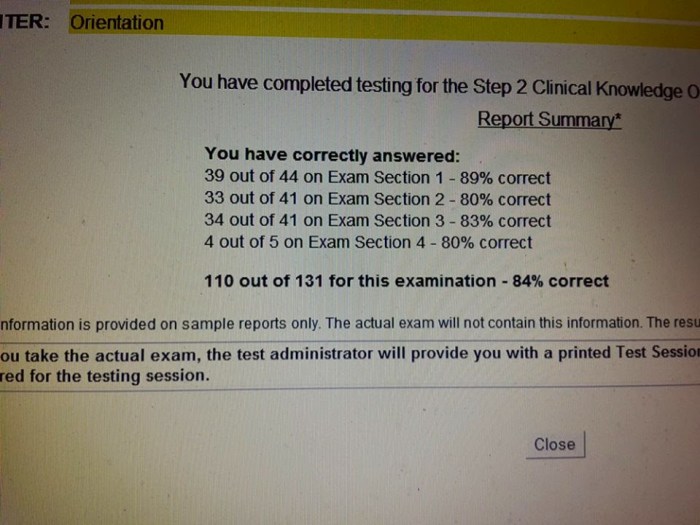
The National Board of Medical Examiners (NBME) 12 is a comprehensive examination that plays a crucial role in the medical licensing process. It assesses the knowledge and clinical skills of medical school graduates who are preparing to enter residency programs.
The NBME 12 is a standardized, computer-based exam that consists of 200 multiple-choice questions. These questions cover a wide range of medical topics, including internal medicine, surgery, pediatrics, obstetrics and gynecology, psychiatry, and family medicine.
Exam Structure
The NBME 12 is divided into eight blocks of 25 questions each. Each block is timed, and test-takers have approximately 45 minutes to complete it. The exam is designed to assess a candidate’s ability to apply medical knowledge to clinical scenarios and make appropriate diagnostic and treatment decisions.
Scoring System
The NBME 12 is scored on a scale of 1 to 300. A score of 200 or above is considered passing. The score report provides a detailed breakdown of a candidate’s performance in each medical topic area.
Exam Content and Coverage: Nbme 12 Answers Step 2
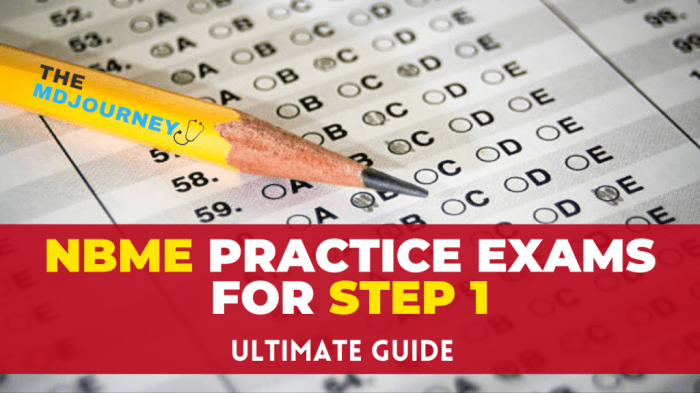
NBME 12 encompasses a wide spectrum of clinical topics, mirroring the diverse range of medical conditions encountered in real-world practice. Its content distribution aligns with the relative prevalence of various diseases and the importance of specific clinical skills in patient management.
Core Clinical Topics
The exam places significant emphasis on core clinical topics that form the foundation of medical practice. These include:
- Internal Medicine (e.g., cardiology, pulmonology, gastroenterology, endocrinology)
- Surgery (e.g., general surgery, orthopedics, urology, neurosurgery)
- Obstetrics and Gynecology
- Pediatrics
- Psychiatry
- Family Medicine
Emphasis on Clinical Reasoning
NBME 12 is not merely a test of medical knowledge but also assesses candidates’ clinical reasoning and problem-solving abilities. It presents complex clinical scenarios that require candidates to apply their knowledge, interpret data, and make sound clinical decisions.
If you’re tackling NBME 12 Answers Step 2, you’ll want to brush up on your Excel skills. Check out How To Sum In Excel for a quick refresher. This comprehensive guide will help you master the basics of summing in Excel, a skill that will come in handy when analyzing NBME 12 Answers Step 2 data.
The exam emphasizes the following aspects of clinical reasoning:
- Differential diagnosis: Identifying the most likely diagnoses based on the patient’s presentation
- Diagnostic testing: Selecting appropriate tests to confirm or rule out diagnoses
- Treatment planning: Developing and implementing effective treatment plans
- Patient management: Monitoring patient progress and adjusting treatment as needed
Preparation Strategies
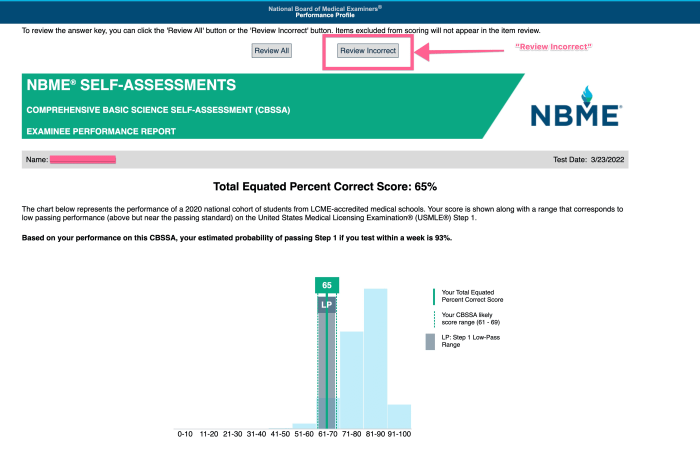
To excel in NBME 12, effective preparation is crucial. Here are some proven study methods and resources to guide your journey:
Study Resources:
- UWorld Qbank:Considered the gold standard, UWorld offers a comprehensive question bank that closely simulates the actual exam.
- NBME Practice Tests:Official NBME practice tests provide valuable insights into the exam format and question style.
- First Aid for the USMLE Step 2 CK:This comprehensive review book covers essential concepts tested on the exam.
- Online Review Courses:Consider enrolling in a reputable online review course to access structured study plans and expert guidance.
Study Methods:
- Active Recall:Regularly test your knowledge by actively recalling information without looking at your notes.
- Spaced Repetition:Review material at increasing intervals to strengthen memory retention.
- Concept Mapping:Create visual diagrams to connect and organize key concepts.
- Flashcards:Utilize flashcards for quick memorization and retrieval of important information.
Time Management and Question-Answering Techniques:
Time Management:
- Allocate time wisely during the exam, ensuring you complete all questions within the time limit.
- Prioritize questions based on your confidence level and potential points.
- Use the provided scratch paper to jot down important information or calculations.
Question-Answering Techniques:
- Read the question carefully and identify the key concepts being tested.
- Eliminate obviously incorrect answer choices first.
- Consider the most likely answer and support your choice with evidence from the question.
- Be aware of common question traps, such as “not all of the above” or “except.”
Building Stamina and Managing Exam-Day Anxiety:
Building Stamina:
- Practice taking timed practice tests to build endurance.
- Stay hydrated and well-rested before and during the exam.
- Take breaks during practice tests to simulate the actual exam environment.
Managing Exam-Day Anxiety:
- Practice relaxation techniques, such as deep breathing or meditation.
- Arrive at the exam well-rested and prepared.
- Trust in your preparation and focus on performing to the best of your ability.
Remember, effective preparation is the key to success in NBME 12. By implementing these strategies, you can increase your confidence and maximize your performance on exam day.
Question Analysis
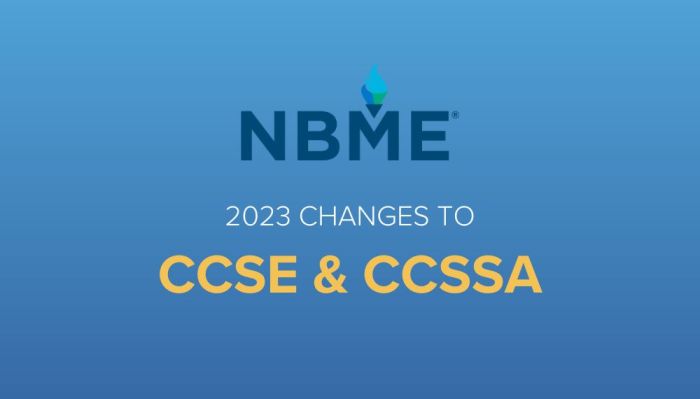
NBME 12 presents a diverse array of question types and formats, challenging candidates to demonstrate their understanding of medical knowledge and clinical reasoning skills.
To excel on this exam, it is crucial to develop effective strategies for dissecting questions, identifying key information, and eliminating incorrect answer choices.
Understanding Question Stems
The question stem provides the context and instructions for the question. It is essential to read the stem carefully to identify the specific task being asked. This may involve diagnosing a condition, selecting the best treatment option, or interpreting laboratory results.
Identifying Key Information
Within the question stem and answer options, key information is often hidden or presented in a confusing manner. It is important to be able to extract this information and organize it in a logical way.
- Relevant Patient History:Age, sex, medical history, and current symptoms can provide valuable clues.
- Physical Exam Findings:Objective observations, such as vital signs, rashes, or neurological deficits, can help narrow down the differential diagnosis.
- Laboratory and Imaging Results:Tests can confirm or rule out specific conditions.
- Pathophysiology:Understanding the underlying disease processes is essential for selecting appropriate treatments.
Eliminating Incorrect Answer Choices
Once you have identified the key information, you can begin to eliminate incorrect answer choices. This can be done by:
- Identifying Contradictions:If an answer choice directly contradicts the information provided in the question, it can be eliminated.
- Applying Logical Reasoning:Some answer choices may seem plausible but do not follow logically from the information given.
- Considering the Most Likely Diagnosis:Based on the key information, you can often determine which answer choice is most likely to be correct.
Test-Taking Tips
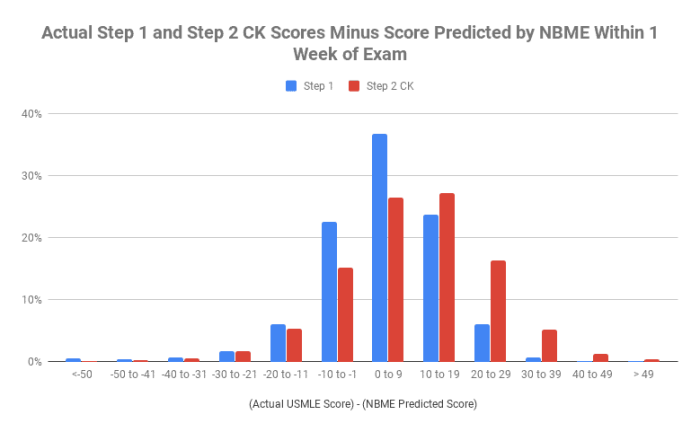
Navigating the NBME 12 exam requires a strategic approach and effective time management. Understanding the different question types and developing tailored strategies for each will enhance your performance.
Multiple-Choice Questions
- Carefully read the stem and all answer choices, identifying s and eliminating obviously incorrect options.
- Consider the context of the question and apply your medical knowledge to determine the most likely answer.
- Avoid common pitfalls like choosing the “all of the above” option unless you are certain all choices are correct.
Case-Based Questions
- Read the case scenario thoroughly, paying attention to important details and patient presentation.
- Identify the clinical problem and formulate a differential diagnosis based on the information provided.
- Select the answer that most accurately reflects the appropriate next step in patient management or diagnosis.
Image-Based Questions
- Examine the image carefully, identifying key features and anatomical structures.
- Apply your knowledge of radiology and pathology to interpret the findings and determine the most likely diagnosis.
- Correlate the image findings with the clinical information provided in the question stem.
Pacing and Time Management
- Allocate a specific amount of time for each question and stick to it to avoid getting bogged down.
- If you encounter a particularly challenging question, flag it and move on, returning to it later if time permits.
- Use the time remaining at the end of each block to review your answers and make any necessary changes.
Reviewing Answers, Nbme 12 answers step 2
- After completing each block, take a few minutes to review your answers and identify any areas where you are unsure.
- Re-read the questions and answer choices carefully, considering alternative interpretations or perspectives.
- If you change an answer, make sure you have a valid reason for doing so and that the new answer is more accurate.
Post-Exam Evaluation
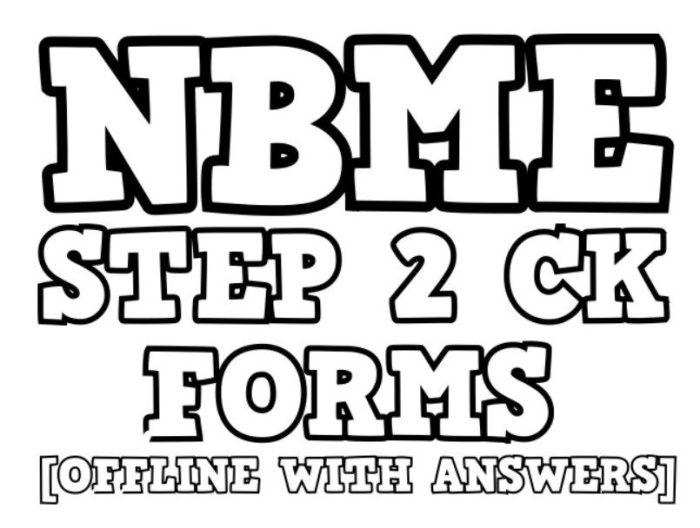
Post-exam evaluation is a crucial step in the NBME 12 journey. It allows you to assess your performance, identify areas for improvement, and plan your future study and career strategies.
Score Interpretation
Your NBME 12 score provides valuable insights into your strengths and weaknesses. The score range is typically between 100 and 250, with higher scores indicating better performance. Compare your score to the national average and your target score to gauge your progress.
Exam Review
Thoroughly review your exam results, paying attention to the questions you answered incorrectly or marked for review. Analyze your mistakes and identify patterns or areas where you need additional study. This will help you focus your efforts on improving your understanding and test-taking skills.
Study Planning
Based on your exam review, develop a targeted study plan that addresses your specific weaknesses. Focus on understanding the underlying concepts, practicing question-solving techniques, and improving your time management skills.
Career Planning
Your NBME 12 score can also inform your career planning. If you are aiming for a competitive specialty or residency program, a high score can strengthen your application. Conversely, if you identify areas for improvement, you can adjust your study and career goals accordingly.
FAQs
What is the significance of NBME 12 Step 2?
NBME 12 Step 2 is a crucial assessment in the medical licensing process, evaluating your clinical knowledge, problem-solving abilities, and readiness for independent medical practice.
How should I prepare for the NBME 12 Step 2 exam?
Effective preparation involves understanding the exam structure, focusing on core clinical topics, practicing question-answering techniques, and building stamina for the exam day.
What is the best way to analyze NBME 12 sample questions?
When analyzing sample questions, pay attention to question stems, identify key information, eliminate incorrect answer choices, and understand the rationale behind the correct answer.